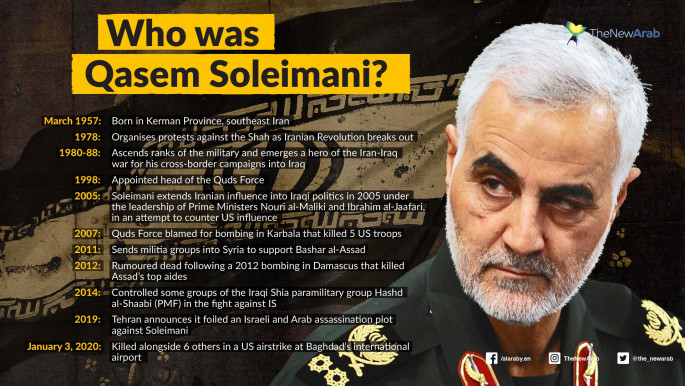
Trump is on a reckless drive to war, and Congress is powerless to stop him
Meanwhile, some Democratic members of Congress are feverishly working to prevent the Trump administration from embarking upon yet another potentially endless war.
But they face an uphill battle, as President Trump appears bent on waging war without providing a public justification for his use of force. Under the War Powers Act, the president is required to notify Congress within 48 hours that the United States has engaged in hostilities, and to lay out the reasons for doing so.
Most often, at least part, if not all of these notifications are public, allowing US citizens to judge for themselves whether the use of force is warranted or not. However, Trump's notification, received by Congress last Saturday, was wholly classified.
Even more worrisome, after reviewing the classified notification, Speaker of the House Nancy Pelosi (D-CA) warned that it raises "serious and urgent questions about the timing, manner and justification of the administration's decision to engage in hostilities against Iran."
"The highly unusual decision to classify this document in its entirety compounds our many concerns, and suggests that the Congress and the American people are being left in the dark about our national security," she added.
Given the fact that inaccurate classified information was cherry-picked by the Bush administration to sell the US public on war against Iraq in 2003, this is alarming, to say the least.
 |
President Trump appears bent on waging war without providing a public justification for his use of force |  |
Trump also seems to be intent on eviscerating the constitutional prerogative of Congress to declare war. This solemn responsibility was entrusted by the constitution's framers to Congress to widely share this momentous decision, rather than leave it to the caprice of an individual.
In a mockery of the constitution and an unprecedented preemptive declaration of war by social media, Trump Tweeted on Sunday: "These Media Posts will serve as notification to the United States Congress that should Iran strike any U.S. person or target, the United States will quickly & fully strike back, & perhaps in a disproportionate manner. Such legal notice is not required, but is given nevertheless!"
Congress reconvenes today and Democrats are advancing several legislative vehicles simultaneously in a bid to reassert congressional authority to declare war and prevent a conflagration with Iran.
 |
|
| [Click to enlarge] |
Last Friday, Sen. Tim Kaine (D-VA), a member of the Senate Foreign Relations and Armed Services Committees, announced plans to introduce a resolution stipulating that "any hostilities with Iran must be explicitly authorized by a declaration of war or specific authorization for use of military force."
The joint resolution would require the president to end hostile actions against Iran within 30 days, invoking congressional authority vested in the War Powers Act to curtail unsanctioned presidential warfare.
Reps. Ilhan Omar (D-MN) and Barbara Lee (D-CA) announced on Sunday that they will sponsor the House version of the resolution. Their leadership of this initiative is noteworthy. Not only is Omar a member of the House Foreign Affairs Committee; she is also a frequent critic of US militarism who has personally experienced the impact of US interventions abroad, as a former refugee from Somalia.
 |
Republicans have lined up uncritically behind Trump's bellicosity in a display of cult-like obeisance |  |
And Lee iconically cast the lone vote in the House against the 2001 Authorization for Use of Military Force (AUMF) in Afghanistan, presciently warning of the danger of open-ended commitments to war with vague and shifting goals. For the past two decades, she has played a principal role in Congress attempting to repeal both that AUMF and the 2002 AUMF in Iraq which have served as the legal rationale for endless war.
Sen. Bernie Sanders (I-VT) and Rep. Ro Khanna (D-CA) also announced last Friday a complementary initiative to prohibit funding for a US war against Iran absent congressional authorization. Their leadership reprises their historic role in shepherding the first-ever successful invocation of the War Powers Act last year, requiring the United States to end its participation in the Saudi Arabia-led war against Yemen. Trump, however, vetoed that resolution and Congress failed to overturn it.
It also mirrors a similar amendment to last year's must-pass National Defense Authorization Act which Khanna and Rep. Matt Gaetz (R-FL) sponsored. That amendment passed the House on a bipartisan basis but was stripped out of the final version of the bill due to White House pressure.
Read more: US insists no plans to pull out of Iraq despite Baghdad's vote
First-term Rep. Elissa Slotkin (D-MI) is also reportedly working on similar legislation. As a former CIA analyst on Shia militias, her expertise will lend gravitas to her bill. Having worked this portfolio under the Bush and Obama administrations, Slotkin tellingly admitted that both presidents similarly considered assassinating Qassem Soleimani, but "determined that the ultimate ends didn't justify the means."
Undoubtedly, Democrats will be able to pass one or more of these pieces of legislation in the House; but they will all run into a buzzsaw at the Republican-controlled Senate. After Soleimani's assassination, Republicans have lined up uncritically behind Trump's bellicosity in a display of cult-like obeisance.
And even if enough Republicans miraculously came to their senses and joined their Democratic colleagues in the Senate in passing a War Powers Act resolution, there would still not be enough votes to override a certain Trump veto. Despite the best intentions of some in Congress, a viable, legislative check on Trump's impulsive and reckless drive to war with Iran seems impossible.
Josh Ruebner is senior principal at Progress Up Consulting and author of Israel: Democracy or Apartheid State? and Shattered Hopes: Obama's Failure to Broker Israeli-Palestinian Peace.
Follow him on Twitter: @joshruebner
Opinions expressed in this article remain those of the author and do not necessarily represent those of The New Arab, its editorial board or staff.



